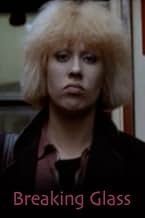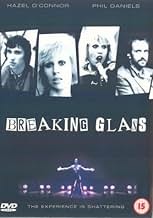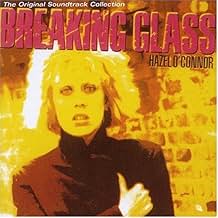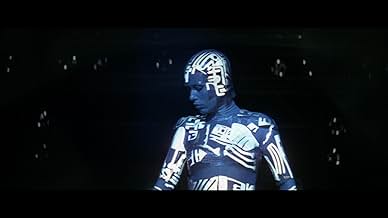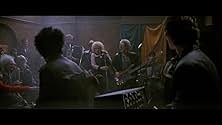VALUTAZIONE IMDb
6,8/10
1680
LA TUA VALUTAZIONE
Aggiungi una trama nella tua linguaA rock singer is determined to rise to the top of the profession, letting nothing stand in the way of that goal.A rock singer is determined to rise to the top of the profession, letting nothing stand in the way of that goal.A rock singer is determined to rise to the top of the profession, letting nothing stand in the way of that goal.
- Regia
- Sceneggiatura
- Star
- Nominato ai 1 BAFTA Award
- 2 candidature totali
Lowri Ann Richards
- Jane
- (as Lowri-Ann Richards)
Recensioni in evidenza
Very much a political commentary on the disenfranchisement of youth and accurately summing up the feelings of the under 20s at that time, if not the reality.
The film was made just after the nation had suffered 'The Winter of Discontent' the final humiliation of the disastrous socialist government that had destroyed the aspirations and job prospects of a generation. This also led to the famous election of the far-right Thatcher government at the same time, but, they had not been in office for long enough to affect the approach of the film.
I saw the film at the time it was first shown, and being a punk and having a father that was a trade union leader at the time, much of what was portrayed in the film was familiar to me.
Although the film was very much trying to be a 'grim Northern realism' film for the 80s (and set in the south at that!), it was pure fantasy - things were never that bad, and it's easy to get depressed about situations that are portrayed as every-day occurrences that either never happened or were rare. The scenes of race riots are particularly overstated.
The music of the film, however, is it's strongest area. It is absolutely of its time, and completely representative. It is so classic that "In the beginning..." was being played in a country pub that I was in only last week (9/99) nearly 20 years later. What followed was 'New Wave' with 'Duran Duran' and others - what a disaster!
Given the slow degradation of the main character over the duration of the film, it is interesting to see what happened the the actress who played her (Hazel O'Connor) in real life. Life imitating art?
The film was made just after the nation had suffered 'The Winter of Discontent' the final humiliation of the disastrous socialist government that had destroyed the aspirations and job prospects of a generation. This also led to the famous election of the far-right Thatcher government at the same time, but, they had not been in office for long enough to affect the approach of the film.
I saw the film at the time it was first shown, and being a punk and having a father that was a trade union leader at the time, much of what was portrayed in the film was familiar to me.
Although the film was very much trying to be a 'grim Northern realism' film for the 80s (and set in the south at that!), it was pure fantasy - things were never that bad, and it's easy to get depressed about situations that are portrayed as every-day occurrences that either never happened or were rare. The scenes of race riots are particularly overstated.
The music of the film, however, is it's strongest area. It is absolutely of its time, and completely representative. It is so classic that "In the beginning..." was being played in a country pub that I was in only last week (9/99) nearly 20 years later. What followed was 'New Wave' with 'Duran Duran' and others - what a disaster!
Given the slow degradation of the main character over the duration of the film, it is interesting to see what happened the the actress who played her (Hazel O'Connor) in real life. Life imitating art?
I first saw the film when it landed on US cable a year after it came out. It blew my little head away, I was only 16 and it was the first new wave music I'd heard, having been a strictly folky, classical kid growing up. The music mesmerized me, as did Hazel O'Connor's amazing look and charismatic vocal performances, and Phil Daniels' tough but soft Cockney manager just stole my heart. But I think my favorite character was Jonathan Pryce's drugged out sax player. He was so out of place in the band and so harmless and pathetic, he just begged for sympathy. Favorite scenes, the performance when the lights went out, and the love scene on the train.
Okay, so the movie isn't the Rose! But it was really excellent for its limited budget and for its portrayal of the Britain of the early 80's, exploding with rebellious youth, looking for a way out of the dole queue. I went to Britain only a couple of years later and found the movie to have been very reflective of the atmosphere I found when I was there.
If you get a chance to, see it. It is a great movie, with some wonderful performances, and the music will blow you away.
Okay, so the movie isn't the Rose! But it was really excellent for its limited budget and for its portrayal of the Britain of the early 80's, exploding with rebellious youth, looking for a way out of the dole queue. I went to Britain only a couple of years later and found the movie to have been very reflective of the atmosphere I found when I was there.
If you get a chance to, see it. It is a great movie, with some wonderful performances, and the music will blow you away.
Breaking Glass is an excellent movie which has suffered from neglect and wholly inaccurate political associations. This movie was written and made in 1978 and 1979 and released in 1980. Therefore it couldn't possibly be: "A truly excellent portrayal of 80s Britain".Nor does it depict life in: "Thatcher's Britain".
In fact Breaking Glass depicts Callaghan's Britain, which was characterised by a deplorable catalogue of industrial disputes, strikes, high unemployment, and collapsing public services during the winter of 1978-9, dubbed the 'Winter of Discontent'.
What this movie is, is one of the best kept secrets in British cinema history. And although Hazel O'Connor enjoys second billing to Phil Daniels who had just done Quadrophenia to great acclaim, she is one of the greatest talents we've ever produced. Indeed, Hazel shines as the real star throughout, possibly drawing on her own personal experiences growing up in Coventry following the break-up of her parent's marriage, which lead to her running away to Europe at the age of 16.
I saw this film in the cinema the week it was released in the UK and I was stunned by both Hazel's singing and acting talent as well as that of the saxophonist superbly played (and dubbed) by Jonathan Pryce. That solo is a classic all on its own. Every feeling I felt at the time whilst watching this stark portrayal of human nature and the workings of the music industry has stayed with me until today.
In many ways Breaking Glass suffers from being too current. All stories of social history work best when set in the past. Quadrophenia worked because it spoke of a previous period of disruptive British history - 20 years in the past. Also, there was already an undercurrent of opposition to Thatcher, but the country the Conservatives inherited from Labour on 4th May 1979 was a wreck. So it was perhaps convenient for some to use it as a metaphor for the greed and excess that was in fact still yet to come.
See this movie and enjoy it for what it is: a landmark in British Cinema history and a brilliant one-off performance from everyone involved. And catch Hazel on the net, where she sells much of her music, and live on stage where she's still gigging.
In fact Breaking Glass depicts Callaghan's Britain, which was characterised by a deplorable catalogue of industrial disputes, strikes, high unemployment, and collapsing public services during the winter of 1978-9, dubbed the 'Winter of Discontent'.
What this movie is, is one of the best kept secrets in British cinema history. And although Hazel O'Connor enjoys second billing to Phil Daniels who had just done Quadrophenia to great acclaim, she is one of the greatest talents we've ever produced. Indeed, Hazel shines as the real star throughout, possibly drawing on her own personal experiences growing up in Coventry following the break-up of her parent's marriage, which lead to her running away to Europe at the age of 16.
I saw this film in the cinema the week it was released in the UK and I was stunned by both Hazel's singing and acting talent as well as that of the saxophonist superbly played (and dubbed) by Jonathan Pryce. That solo is a classic all on its own. Every feeling I felt at the time whilst watching this stark portrayal of human nature and the workings of the music industry has stayed with me until today.
In many ways Breaking Glass suffers from being too current. All stories of social history work best when set in the past. Quadrophenia worked because it spoke of a previous period of disruptive British history - 20 years in the past. Also, there was already an undercurrent of opposition to Thatcher, but the country the Conservatives inherited from Labour on 4th May 1979 was a wreck. So it was perhaps convenient for some to use it as a metaphor for the greed and excess that was in fact still yet to come.
See this movie and enjoy it for what it is: a landmark in British Cinema history and a brilliant one-off performance from everyone involved. And catch Hazel on the net, where she sells much of her music, and live on stage where she's still gigging.
I have watched this movie and although it is dated and low budget there is much more to this movie than "A low budget post punk Star is born!" There is the main story about a rebellious anti-establishment singer "Kate" played by Hazel O Connor who in order to "make it" has to give up control of her music and is forced on to the record company "bandwagon". This results in her losing the bands manager "Danny" (brilliantly played by Phil Daniels)who feels he is losing control of the band! But more than this, the movie is an accurate reflection of the post-punk anti-establishment feeling in England which I lived through at the time. The lyrics of Hazel's songs depict this and still have something to say today regarding Government and establishment control! However, the greatest irony is the climax of the movie where Kate (Hazel O Connor) is singing the song "Eighth day" as a protest against the establishment when she herself is having to "fit in to the establishment" to perform the song. Well worth another look!
I first came to breaking glass some years ago after having heard a track from the film. When I first watched it I thought it was shocking but after coming back to it years later I can see so much more in it. It's a truly excellent film depicting life in Thatcher's Britain as well as a wry view of the music industry. Hazel O'Conner is underrated in my view but she does excel here. Excellent film and even better soundtrack.
Lo sapevi?
- QuizThe movie was cut for its American theatrical release in the USA where approximately the last ten minutes and the ending were removed.
- Versioni alternativeUS version lacks the ending with Kate in an asylum.
- ConnessioniFeatured in The 100 Greatest Musicals (2003)
- Colonne sonoreOne More Time
Sung by Victi Silva (as Victy Silva)
I più visti
Accedi per valutare e creare un elenco di titoli salvati per ottenere consigli personalizzati
- How long is Breaking Glass?Powered by Alexa
Dettagli
- Data di uscita
- Paese di origine
- Lingua
- Celebre anche come
- La rockera
- Luoghi delle riprese
- Aziende produttrici
- Vedi altri crediti dell’azienda su IMDbPro
Botteghino
- Lordo Stati Uniti e Canada
- 2471 USD
- Lordo in tutto il mondo
- 2471 USD
- Tempo di esecuzione
- 1h 44min(104 min)
- Colore
- Mix di suoni
- Proporzioni
- 2.35 : 1
Contribuisci a questa pagina
Suggerisci una modifica o aggiungi i contenuti mancanti


